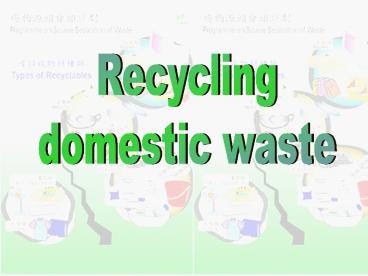Recycling - PowerPoint PPT Presentation
1 / 25
Title: Recycling
1
Recycling domestic waste
2
Background
Why domestic wastes should be recycled?
- In 2004, about 6.41 million tones of wastes were
disposed of in the three landfills in HK. It is
projected that the existing landfills would only
last 6 to 10 years if waste continues to grow at
the current trend. - Therefore, waste reduction and recycling is a
main focus for tackling the waste problem.
3
West New Territories (WENT) Landfill
South East New Territories (SENT) Landfill
North East New Territories (NENT) Landfill
4
Domestic waste can be simply classified into
5
Most waste paper can be collected for recycling,
for example
- Brochures publicity materials
- Magazines Books
- Envelopes (remove plastic window)
- White / coloured writing paper
- Newspapers
- Cartons
- Cardboards
6
Most metals can be collected for recycling, for
example
- Aluminium cans (e.g. soft drink cans, beer cans)
- Metal containers (e.g. clean and empty food cans,
biscuits tins, moon cake boxes) - Mixed metals (e.g. metallic utensil like pots
pans, metallic vacuum flasks)
7
Most plastics can be collected for recycling, for
example
- Plastic container (e.g. bath cream bottles,
beverage bottles, detergent bottles, shampoo
bottles) - Clean plastic bags (e.g. supermarket shopping
bags, packaging) - Mixed plastics (e.g. CDs, cassettes, toys)
8
Others materials
- There are also many disused household items can
be donated to people in need or collected for
recycling, for example, - old clothing
- electrical appliances
- computers
9
(No Transcript)
10
Importance of recycling
- Conserve natural resources and energy
- Reduce pollutions
- Reduce the needs for landfill
- Transform waste materials into useable resources
- Create more job opportunities in recycling
industry - Reduce costs in waste treatment
11
Disadvantages of recycling
- The costs in collecting and separating waste
materials are very high - Recycling may cause more pollution
- e.g. in the recycling of paper, for each ton of
recycled newsprint that's produced, an extra
5,000 gallons of waste water are discharged
12
INTERVIEW
- We have interviewed 30 people with different
ages, jobs and sexes about their habits of
separating domestic waste and their opinion
towards the program on source separation of
domestic waste
13
(No Transcript)
14
(No Transcript)
15
(No Transcript)
16
(No Transcript)
17
(No Transcript)
18
Interviewees opinion towards the program
- Those who support the program
- Can arouse public concern
- Same kind of waste can be recycled efficiently
- Can protect the environment as less resources are
consumed - Those who think that it is not effective
- Not popular, the number of recycle bins are not
enough and their positions are not obvious - Not economical, need a lot of labor and money for
transportation and treatment - More promotion and education are needed
19
Difficulties in promoting waste recycling in Hong
Kong
- Cost in treatment of recycled materials are high
- Not enough place to store recycled materials
- Market demands are small
- Public awareness in recycling is low
- Recycling industry is not common in Hong Kong
- Government does not give too much support on
recycling industries
20
What can the government do to support the program
on recycling?
- consider the implementation of a deposit-refund
charging scheme which requires the producer to
pay the deposit for their waste production. They
have the legal responsibility to collect their
waste after purchase. The deposit will go into a
fund for assisting the recycling industries. It
would provide incentives for producers to reduce
waste and make their products more simply
packaged.
21
What can the government do to support the program
on recycling?
- help the recycling industries to minimize their
operating costs. First, there is available land
in existing industrial estates such as Tai Po or
Junk Bay, This land could be allocated to the
recycling industries with provision of
water-treatment facilities. Using a
deposit-refund system to subsidize the recycling
industries on rent and operating costs could be
integrated with the polluter-pays principle.
22
What can the government do to support the program
on recycling?
- amend the Building Ordinance to require
developers to incorporate recycling facilities
into new buildings, such as providing one or two
more rubbish transfer channels for recycling
materials which can help residents or cleaners to
easily access the recycling facilities. - Reconstructing the existing rubbish-collecting
stations to provide for the sorting of usable
materials would also help to develop the
industry.
23
What can the government do to support the program
on recycling?
- Also, more promotions of the program on source
separation of domestic waste should be done in
order to let more people to know about it. - Allocate more funds in educating the new
generation about the importance of protecting the
environment.
24
What can we do to help?
- The public can increase their awareness and join
in the recycling activities (e.g. participate
actively in the program on source separation of
domestic waste) - Encourage your family members and friends to
support recycling - Knowing the importance of protecting the
environment and be more considerate and produce
less wastes - Think carefully before purchasing goods,
otherwise u are just producing more and more
wastes.
25
THE END!































